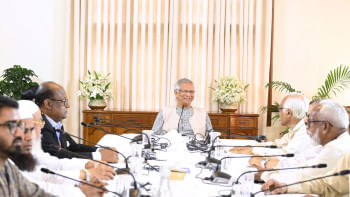South Asia least integrated after Africa
Regional cooperation in South Asia remains in a precarious state, largely due to political decisions that often override economic logic, foreign policy experts said yesterday.
Despite widespread poverty and the looming threat of climate change, South Asia is the least integrated region in the world outside sub-Saharan Africa, they noted, urging honest conversations to improve people's lives.
The observations came on the final day of the two-day Bengal Delta Conference, organised by Dacca Institute of Research and Analytics (DAIRA) at the InterContinental Dhaka.
"SAARC is largely dormant, hampered by India-Pakistan tensions, contested borders, and fragile economies," said Michael Kugelman, senior fellow at the Asia Pacific Foundation, during a panel discussion as part of the conference.
Kugelman said Bangladesh is well-positioned to contribute to regionalism because of its flexible foreign policy, reflected in its 2023 Indo-Pacific Outlook which echoed both US and Chinese priorities. Bangladesh also maintains strong ties with China, Japan, the EU, Russia, the UK, and multilateral lenders.
However, he pointed out Dhaka's limitations -- narrow export base, low FDI, a constrained private sector, strained ties with India, and the Myanmar crisis -- all of which restrict its regional agency. "During the previous government there was a unique type of relationship that in many ways constrained Bangladesh's agency… I think there's an opportunity now that hopefully you can capitalise on," he added.
Prof Mushtaq Khan of SOAS University of London said India's internal politics often spill into its relationship with Bangladesh.
"India is trying to throw out its own Muslims into Bangladesh, saying they are Bangladeshi," he said
Stressing that connectivity cannot advance without trust, he said, "Maybe we should stop talking about roads and rail and transport networks until we solve the fundamental problem about people."
He noted a shift in Bangladesh's outlook from treating India as its dominant partner to seeking balance through engagement with ASEAN, Indonesia, Pakistan, Turkey, the US, and China.
Prof Sreeradha Datta of OP Jindal Global University endorsed Prof Mushtaq's views. "The government of India is constantly talking about its own national interest. But what about Bangladesh's national interest? Threat perception works both ways, and I don't think India has fully recognised that," she said.
She added that Bangladesh's disrupted connectivity with Nepal illustrated how politics, not economics, drives decisions. "These were essentially politically motivated rather than profit motivated," she said, calling for a reset of relations across South Asia, though she admitted such change was unlikely soon.
Dr Amena Mohsin, former professor of international relations at Dhaka University, said connectivity in the region is largely reduced to infrastructure, not connectivity of minds. "For me, if you want to have a South Asia, that South Asianness has to be there -- the meeting of people's minds where you can identify yourself as a South Asian."
Jahangirnagar University Prof Shahab Enam Khan, who moderated the discussion, said the very idea of market and private sector-driven resources is being exploited through political preferences, whether it is saffron, rightism, or nationalism.
"While regionalism remains constrained, the path forward lies in recognising micro-level issues, strengthening people-to-people ties, and depoliticising trade and connectivity."

 For all latest news, follow The Daily Star's Google News channel.
For all latest news, follow The Daily Star's Google News channel. 



Comments